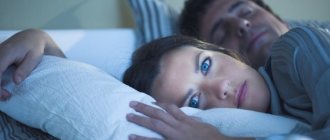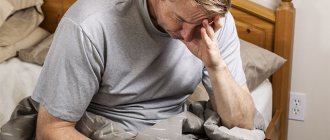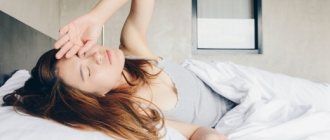The first thing we sacrifice in the modern rhythm of megacities, when we realize that 24 hours a day is sorely lacking to achieve our goals, is sleep. Many experts and my mother say that it’s in vain. There is an established opinion that a person needs to sleep at least 8 hours a day. What if you simply don’t feel like sleeping? Together with an expert from Osteo Poly Clinic, neurologist and somnologist Olga Begasheva
Let's figure out whether lack of sleep is so terrible and how many hours of proper rest are enough to restore the body.
How much sleep do you need?
The need for sleep is determined genetically, and on average it ranges from 5 to 8 hours. And in some cases, even 10 hours of sleep is the norm. Problems with falling asleep occur mainly in old age and are more common in women. By the age of 50, almost 40% of all women suffer from insomnia. And after 65 years, sleep disturbances no longer increase. An American survey of 70-year-olds showed that on average, if they have problems sleeping, they sleep only 6-7 hours, if not - 7.5 hours.
The need for sleep increases during periods of intense growth in children - this is the first growth spurt at 6-7 years and approximately at the age of 13-16 years. Long and healthy sleep is also necessary for athletes. During intense physical activity, a somatotropic hormone is needed, which is released in the first third of the night and affects the growth and development of the body.
Photo: istockphoto.com
Rules for falling asleep easily
It happens that the body simply does not want to “switch off” when it is needed. There are several techniques to help him.
First, make sure that your body is as comfortable and light as possible. For this:
- Relax your body parts gradually, from top to bottom. Start with the muscles of the face and neck.
- If the jaw is clenched, it should be lowered.
- Take the load off your shoulders, lower them too.
- Look at each hand in turn and feel a wave of relaxation flow through them.
- Let the wave go further through the body, alternately relaxing the chest, stomach, hips, legs, reaching the fingertips.
When the body has reached maximum relaxation, proceed to visualization. To quickly fall asleep, mentally imagine different scenes with your eyes closed. Here are some options:
- Start peering into the darkness, look at various patterns and shapes, the outlines of objects. Soon you will have an imaginary “cartoon”.
- Imagine any ordinary object in monotonous motion. For example, a board on the water. Watch how she swings on the waves and stays in place.
- Draw in your imagination, in as much detail as possible, a lake overgrown with water lilies. Imagine being in a boat in the middle of its waters. The boat rocks slowly as you lie on your back and look up at the blue sky.
It is worth considering that perfect sleep may not happen the first time. It's important to understand that this is normal. Any body needs time to readjust. Just keep trying and analyze your condition to understand what is best for you.
What happens to the body during sleep?
Sleep is the same altered state as wakefulness. It is essential for recovery, for immunity, for growth, for memory. But the most important function of sleep is the preservation of a person as an individual: memory and images. At this time, our inner self is restored and rested.
An experiment was conducted: a competition was held among the subjects to see who would stay awake the most nights. Unfortunately, during the experiment, the person who, by the way, won, gradually began to go crazy. It was an irreversible condition. Since then, such experiments have been prohibited, but the results of the study have proven that sleep is the main function of restoring not only the body, but also the internal state. This is a very important psychological aspect.
Another important point concerns circadian rhythms. The fact is that according to the “internal clock”, from about one to three in the morning the stomach is restored - this is its biologically active time, from 3:00 to 6:00 - the intestines, in the morning the adrenal glands are actively turned on, cortisol is produced. And, naturally, those people who abuse sleep disorders and have a deficiency of it, end up with health problems.
Photo: istockphoto.com
Sleeping 6 hours: what is its harm?
that six hours of sleep is harmful in 2004. Then an experiment was conducted at the University of Pennsylvania with the participation of 48 people. During the experiment, their sleep was reduced to 4, 6 and 8 hours. Some people did not sleep at all for two days - but there is no need to talk about the dangers of this approach. Subscribe to our page on Instagram!
Afterwards, participants were asked to describe their condition and record any changes. So, the following results were obtained: 1. The subjects who slept for 8 hours had the best indicators of mental processes. 2. Subjects who slept for 4 hours complained that their cognitive processes were constantly deteriorating.
What problems arise with sleep deficiency?
First of all, performance suffers: headaches, impaired memory, attention, a person is no longer able to cope with the amount of work that he did before. The mood changes very dramatically. This is called the simple everyday word “depression,” but depression in the academic sense is understood as a violation of the production of all neurotransmitter systems. First of all, dopamine, and this hormone affects mood, strength, and endurance. Then - norepinephrine - and this is concentration, attention, these are the functions of finishing what you started. After – serotonin – this again affects mood, maintaining vascular tone and muscle tone.
In severe cases, sleep deficiency leads to serious psychosis, and insomnia is one of the severe syndromes. In age groups, there is a risk of developing Alzheimer's disease, Parkinson's disease, sclerosis and other diseases. That is, in sleep, due to its lack, the cells of the nervous system do not recover.
Lack of sleep leads to a decline in immunity, the production of antibodies, memory, and attention are disrupted. Moreover, it increases the chances of a shortened life due to sudden disruptions in circadian rhythms. That is, those who have clear circadian rhythms live long. The key to health is the so-called Swiss regime - falling asleep and waking up at the same time every day.
Photo: istockphoto.com
Rhythm, hormones and cellular waste
There is a canonical story about the French chronobiologist Jean-Jacques de Meran, who in 1729 imprisoned the mimosa pudica in a dark box. So he learned that she shamelessly opens and closes her petals, regardless of the incoming light. Which means, according to the internal rhythm. The incredible story was taken seriously only in the 60s of the last century, and then it was discovered that almost all life on Earth has such an internal schedule. It was called the circadian rhythm (CR).
In the 90s, scientists went even further and unraveled the molecular mechanism underlying CR, for which in 2017 the Nobel Committee awarded a prize and a million dollars. After this, circadian rhythms, which were fashionable to mention ten years ago, again entered the top list of hot topics.
Researchers rushed to find out why nature needed to build an internal schedule into its sons. One of the advanced hypotheses says: in distant, distant times, in the deep depths of the world's oceans, cyanobacteria obsessively engaged in photosynthesis and was very successful - the planet began to fill the planet with oxygen. For most of the life forms of that time, it was more of a poison, and in order to get along with an unpleasant neighbor, they began to be active at night, when photosynthesis subsided. Cyanobacteria's time management was just the opposite.
There are debates about the correctness of the hypothesis, scientists offer alternatives, but their leitmotif is always the same - circadian rhythms help organisms optimize life processes adequately to the environment. The cave fish Phreatichthys andruzzii, blind and living in eternal darkness, is guided by its diet, D. rerio - by light and food. Other marine life depends on the cycle of tides, but for humans the most important thing is sunlight.
To recognize it, we have special cells with the terrible name “photosensitive retinal ganglion cells” (pRGC). These are not ordinary rod-cones that respond to colors and light - pRGCs are tailored strictly for sunsets and sunrises. Therefore, blind people who would not be able to read this article can easily “read” the change of day. However, pRGCs recognize one color - blue. This is why it is easier for us to fall asleep in the light of a warm table lamp and garlands, and more difficult under a fluorescent one.
The circadian rhythm of an ordinary adult Homo Sapiens is 24 hours 18 minutes, and the suprachiasmatic (su-pra-hi-az-ma-ti-ches-ko-e) nucleus helps us adjust it to the ideal 24 hours. It receives nerve signals from the pRGC and transmits news about the cycle of day and night to the brain through commands to the pineal gland: to actively produce cortisol, the “stress hormone,” during the day, and to produce melatonin, the “vampire hormone,” at night.
Along with them, we have another regulator - adenosine. It accumulates as our cells work hard, either within the cells themselves or on their surface. At the end of the day we tend to get sleepy because there is too much adenosine. It makes us feel tired and slightly hungover - at its peak, this neurotransmitter drowns out the brain signals responsible for our alertness.
What are the main causes of insomnia?
Insomnia is a severe condition for the body. If a person has a toothache or pulpitis occurs, he must go to the dentist and treat the problem. This also applies to any other diseases. But in the case of insomnia, a person sometimes remains in such a serious condition for a long time, for years. The body, finding itself without help, loses its last resources. Although today treating insomnia is no more difficult than treating a tooth. The topic has been studied, there is such a somnology and specialists - somnologists who deal with this.
psychological reasons
:
- stress;
- anxiety states;
- neuroses.
Physiological
:
- hormonal imbalance;
- insufficient insulin production (for example, in diabetes mellitus);
- painful sensations.
External
:
- violation of the regime;
- excessive consumption of tonic drinks;
- overeating or starvation;
- unventilated room;
- abuse of gadgets.
Photo: istockphoto.com
Truths and myths about sleep for older people
Older people often experience daytime sleepiness and are therefore considered to have trouble sleeping at night. However, a study of two groups (the first of 30 men and women with an average age of 25 years, the second of 23 with an average age of 83 years) showed that older people only think that they experience drowsiness more often and more strongly than younger people [1].
Participants took a test to determine the frequency of periods of latent sleepiness during the day (Multiple Sleep Latency Test). This technique is aimed at identifying increased daytime sleepiness, and testing is required to be carried out during daylight hours. Over the course of a whole day, the subject is asked to fall asleep on a bed in a darkened room 5 times. This task needs to be completed in 20 minutes. If the subject managed to fall asleep, then after 15 minutes of sleep he is woken up and asked to leave the room for two hours. If after twenty minutes you have not been able to fall asleep, you still need to leave the room and enter it after two hours. During each attempt, an electroencephalogram and electrocardiogram are taken from the study participant, and breathing and heart rate are also measured. Such a comprehensive (polysomnographic) analysis allows us to determine how long it took a person to fall asleep and what stage of sleep he was in during the next attempt.
The results for the older group were unexpected. During the test, they fell asleep as often and as quickly as the younger ones. True, the older participants themselves seemed to fall asleep faster. It turns out that 80-90 year olds experience drowsiness no more often than younger people, even if they themselves think otherwise.
Sleepiness is not the only parameter of sleep and wakefulness, and the fact that older people are no more sleepy than their grandchildren does not mean that there is no difference between the sleep of these two age categories. There are certainly differences in normal circadian rhythms between the young and the elderly. For example, in one study, two groups of healthy volunteers (18–32 years old and 60–75 years old) slept at home for a week but spent most of the day in the laboratory. Every day, the subjects noted the time when they went to bed and when they woke up. In addition, once every hour and a half, study participants had their body temperature measured, as well as the levels of cortisol and 6-sulfatoxymelatonin in their urine. Cortisol is often called the stress hormone, as it is especially released during difficult life situations. However, the intensity of its production varies throughout the day even in good conditions for the body. Most cortisol is produced in the morning immediately after waking up - at 8–9 o’clock. During the day, its level in the blood gradually decreases, although unevenly: after eating, cortisol levels temporarily increase, but not as much as in the morning. 6-sulfatoxymelatonin is a metabolic product of melatonin, the main “circadian hormone”, which is most produced in the morning shortly before waking up. By diurnal changes in the concentrations of these two hormones, one can track the course of circadian rhythms in humans (Fig. 1)
Figure 1. Daily fluctuations in the concentrations of melatonin, cortisol and somatotropin. The horizontal axis shows the time of day, and the vertical axis shows the concentration of the hormone in mg/dL (deciliter, 100 ml).
www.usdbiology.com
It turned out that young subjects go to bed later, but fall asleep faster. It takes them approximately 45 minutes to fall asleep, versus the typical 95 minutes for older adults [2]. Older people sleep on average two hours less. The peak concentration of 6-sulfatoxymelatonin and cortisol in the urine in representatives of the older age group occurs earlier in the day than in younger people. However, the correlation between changes in the levels of these two hormones and the time of waking up and falling asleep in people 60–75 years old is slightly weaker than in people 18–32 years old. It turns out that in older people, the time of sleep and wakefulness shifts somewhat relative to circadian rhythms.
It is known that not only the total duration of sleep is important, but also what phases of sleep are completed during the night. Conventionally, sleep can be divided into two phases, which replace each other several times throughout the night:
- REM sleep (fast wave, paradoxical, stage of rapid eye movements - REM, rapid eye movement - REM);
- slow (non-REM sleep; divided into four stages: falling asleep, shallow sleep, deep sleep, delta sleep).
The phases differ from each other in the frequency of the electrical signal waves visible on the electroencephalogram (EEG), as well as the degree of muscle tension and the presence or absence of rapid eye movements. Both REM and non-REM sleep are important for normal well-being. Animals that were constantly artificially deprived of one of these two phases of sleep lived extremely short lives.
With age, the duration of the REM phase relative to the total sleep time decreases [3], and the proportion of the first and second stages of the non-REM phase from the total sleep time increases [4]. But the relative duration of the fourth stage, delta sleep, decreases.
REM sleep is traditionally associated with dreaming. Since the proportion of this sleep phase decreases in the elderly, the ability to remember one’s dreams should also decrease with age. In addition, dreams can be associated with autobiographical memory, and it, like other types of memory, deteriorates in old age. Both of these assumptions are confirmed by an online survey of 28,888 volunteers aged 10 to 79 years [5].
At the third stage of the non-REM sleep phase, the sigma rhythm , its second name is sleep spindles . EEG studies show that in elderly people the frequency and amplitude of sleep spindles recorded by electrodes over the frontal lobes of the cortex are reduced compared to similar indicators in young people [6]. For each EEG lead (electrode), you can build a graph of changes in the frequency of occurrence and amplitude of sleep spindles, and use it to judge the progress of aging. Probably, knowing the age-related dynamics of sleep spindles in a particular person, in the future it will be possible to identify metabolic and intellectual pathologies in him at an early stage.
What to do about insomnia?
There are different types of insomnia. There are shifts in sleep phases or manifestations of a reaction to stress - then the duration of such a period is only 2-3 months. Afterwards, the person’s condition can return to normal, and sleep will be restored. But there are long-term, severe, so-called endogenous insomnia. The treatment of such diseases is carried out either by a psychiatrist or a somnologist.
When studying insomnia, polysomnography is performed. Diagnosis is also made by questioning and taking an anamnesis. In addition, there are other possible somatic causes. Problems with the liver and intestines are often detected. In this case, the body does not produce serotonin - its deficiency affects sleep disorders. If there is a problem of intolerance to various products, for example, lectins, gluten, they become toxic to the nervous system. In these cases, doctors carry out comprehensive diagnostics, complete treatment, and intensive general strengthening of the body. Xenon therapy, massages and relaxing procedures are also recommended for the treatment of insomnia.
What are the dangers of lack of sleep for a person?
Lack of sleep is fraught with many dangers, both for the human body and for his mood. Chronic lack of sleep clearly affects your appearance, in particular your face. The skin turns pale, blue circles and bags appear under the eyes, and the whites of the eyes turn red. Hair becomes dull, nails become brittle.
Popular negative consequences of lack of sleep also include:
- stress,
- irritability,
- slowness,
- weakened immunity,
- decreased creativity
- constant pain in the body,
- memory problems,
- headache,
- depression,
- persistent drowsiness,
- chills,
- high blood pressure,
- nausea,
- Digestive problems.
Priority list
For a relaxing rest, it is important to go to bed on time. Doctors calculated that every 60 minutes of rest before midnight equals two such periods after. But by the evening, as a rule, a huge number of things that need to be done accumulate. In this case, the end date is pushed back to a later time.
You need to learn to make a list of priorities. It consists of two columns:
- Things postponed until tomorrow. This could be: browsing social networks, talking with colleagues, non-urgent help to friends.
- Be sure to do it before lights out today. This column should contain questions related to health, personal life and property safety.
If you observe the culture of sleep and the evening ritual every day, and do not overload yourself with work or meaningless activities in the evenings, then it is quite possible to get enough sleep in a short time. But you need to listen to your body. Are you experiencing decreased attention, loss of performance, or problems with concentration? It’s worth increasing your rest time!
—>
Disclaimer
Please note that all information posted on the Prowellness website is provided for informational purposes only and does not constitute a personal program, a direct recommendation for action or medical advice. Do not use these materials for diagnosis, treatment or any medical procedures. Consult your physician before using any method or product. This site is not a specialized medical portal and does not replace professional advice from a specialist. The Site Owner does not bear any liability to any party who has suffered indirect or direct damage as a result of improper use of materials posted on this resource.
—> Expert: Elagina MariaBusiness Profi of Siberian Wellness and nutritionist in cosmeticsReviewer: Sergey ShelapuginExpert in the field of health, beauty, proper nutrition and sports -15% Rate the article (16 votes, average 3) We recommend reading on this topicHealthHow loved ones behave in depressionHealthHealthy sleep, or peace of mind day and nightHealthElderly age is a new period of your lifeHealthTerritory of calm: a natural solutionHealthWhich side to sleep on if you have heartburn?HealthHow to improve the quality of sleep?HealthWhy the more you sleep, the more you want to sleep?HealthWhat to do if you constantly want to sleep during the day?We recommend reading on the topic of healthHealthTake ginseng correctlyHealthHow to take amaranth oil?HealthTerrain of calm: natural solutionHealthThe healing properties of amaranthSources used:
- https://proson.online/bessonnica/6-chasov-sna
- https://vyspalsa.ru/6-chasov-sna-eto-normalno/
- https://ru.siberianhealth.com/ru/blogs/zdorove/mozhno-li-vyspatsya-za-6-chasov/
TOP 6 most important conditions for a good night's rest
The use of methods on how to sleep 6 hours and get enough sleep is impossible without taking into account the basic rules of a full, comfortable night's rest. These include the natural requirements of a healthy lifestyle, which every person can follow if desired. If you listen to the tips described below, you can achieve easy, quick sleep and cure insomnia naturally.
Pleasant ritual for the night
This is the main condition for how to quickly fall asleep and get a good night's sleep. Daily repetition of pleasant actions that become a habit guarantees complete rest. Usually recommended:
- take a walk at night;
- listen to pleasant, relaxing music;
- get a massage or exercise for relaxation (yoga);
- take a bath with the pleasant aromas of lavender or essential oils of citrus, fir and other plants.
Features of nutrition and drink consumption
To get a good night's sleep, pay attention to these tips:
- Do not eat food 4 hours before falling asleep. If the body is too hungry, you can eat fruit or drink broth, low-fat kefir, or eat light yogurt.
- Drinking strong tea or coffee also occurs no later than 4 hours. For people suffering from high blood pressure, it is better to avoid these drinks after lunch.
- Drinking energy drinks in the afternoon is not allowed - this interferes with falling asleep and getting a good night's sleep.
It is believed that drinking alcohol helps you fall asleep quickly, which is true, but only partly. Chronic consumption of strong drinks at night leads to sleep disorders.
Physical activity and walking
Sports activities are excluded no earlier than 3-4 hours before the expected night's rest. However, you can take a walk an hour before, and also do light relaxing exercises (for example, yoga). If you turn an evening walk into a daily habit, you will get better sleep.
Conditions in the bedroom
Even a healthy person will not be able to get enough sleep if the appropriate conditions are not created in the bedroom:
- dim, dim light or its complete absence;
- absence of extraneous noise and sharp, intrusive sounds;
- normal air temperature (no more than 20-22oC);
- pleasant, cozy design;
- optimal position of the bed (determined individually);
- lack of a large number of home appliances (computers, televisions, etc.).
Modern technical means provide great opportunities to skillfully relax the body and actually create an atmosphere of relaxation with your own hands in the bedroom.
For example, the use of white noise (sounds of the forest, rain and other natural sounds) muffles extraneous noises. Thick curtains or a blindfold protects against light from outside the window. And dim night lights create a cozy atmosphere in the room.
Optimal selection of bedding
Choose a pillow of sufficient softness/hardness, optimal size and materials. It is also difficult to fall asleep under a blanket that is too hot, on a mattress that is too soft, etc. It is important to take care of all accessories and guarantee yourself a comfortable stay. For example, if you can’t get enough sleep and regularly have a headache, a stiff neck, and tense muscles, the reason is obviously due to an unsuitable pillow (and possibly even a mattress).
Pros and cons of sleeping naked
Doctors and psychologists recommend sleeping without clothes, even without pajamas, because this has its advantages:
- body temperature drops faster, you can quickly fall asleep and get enough sleep;
- the level of the stress hormone cortisol decreases;
- thanks to the reduced temperature, metabolism accelerates and the body recovers faster;
- Psychologically, self-confidence increases.
There are no downsides as such - sleeping without clothes really helps you get a good night's sleep thanks to a comfortable rest.
These tips should be applied not only to those who want to get six hours of sleep, but to all people. Healthy sleep is the basis for normal performance, and chronic lack of sleep gradually undermines the body's strength. Therefore, saving on time for a night's rest is unacceptable.











